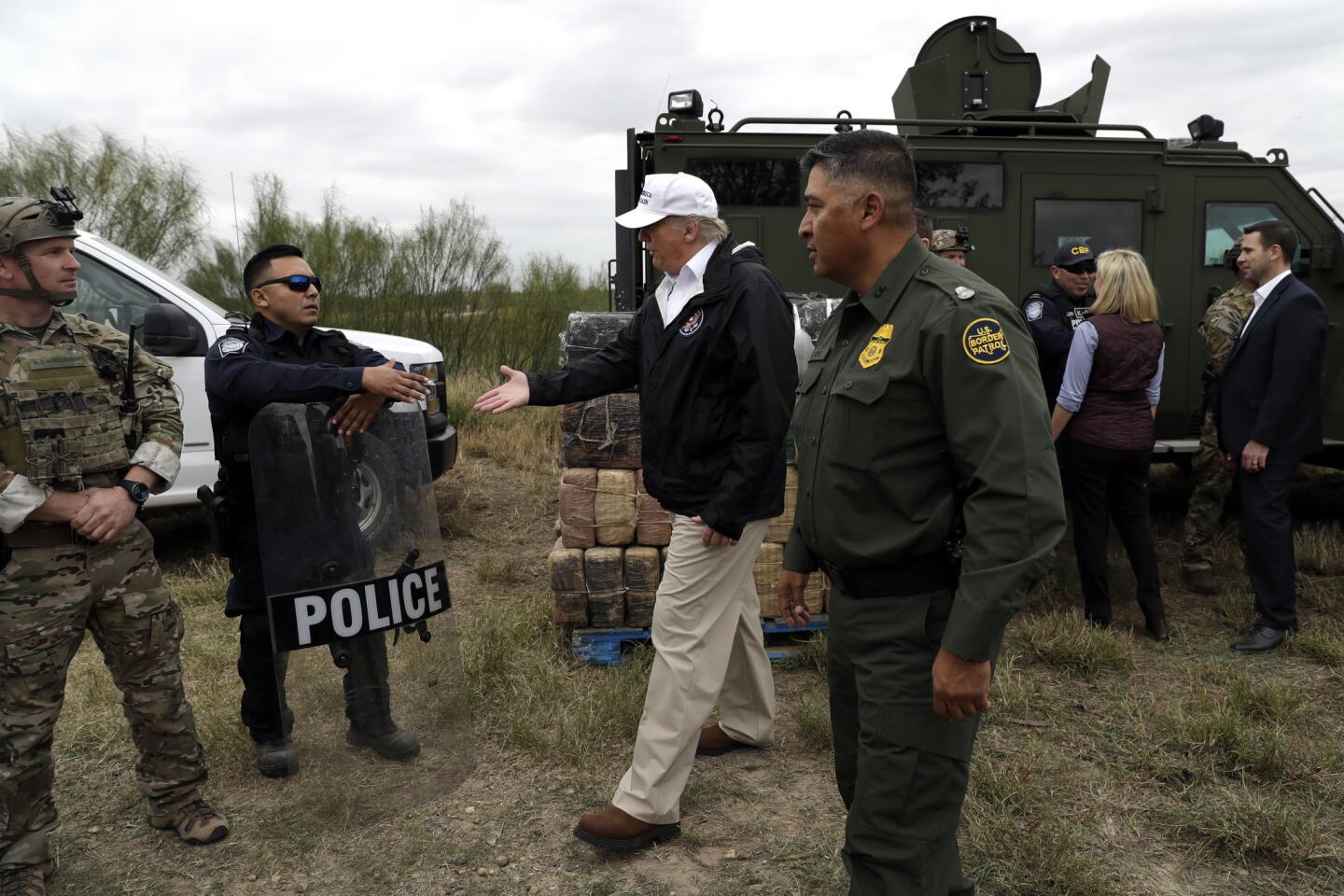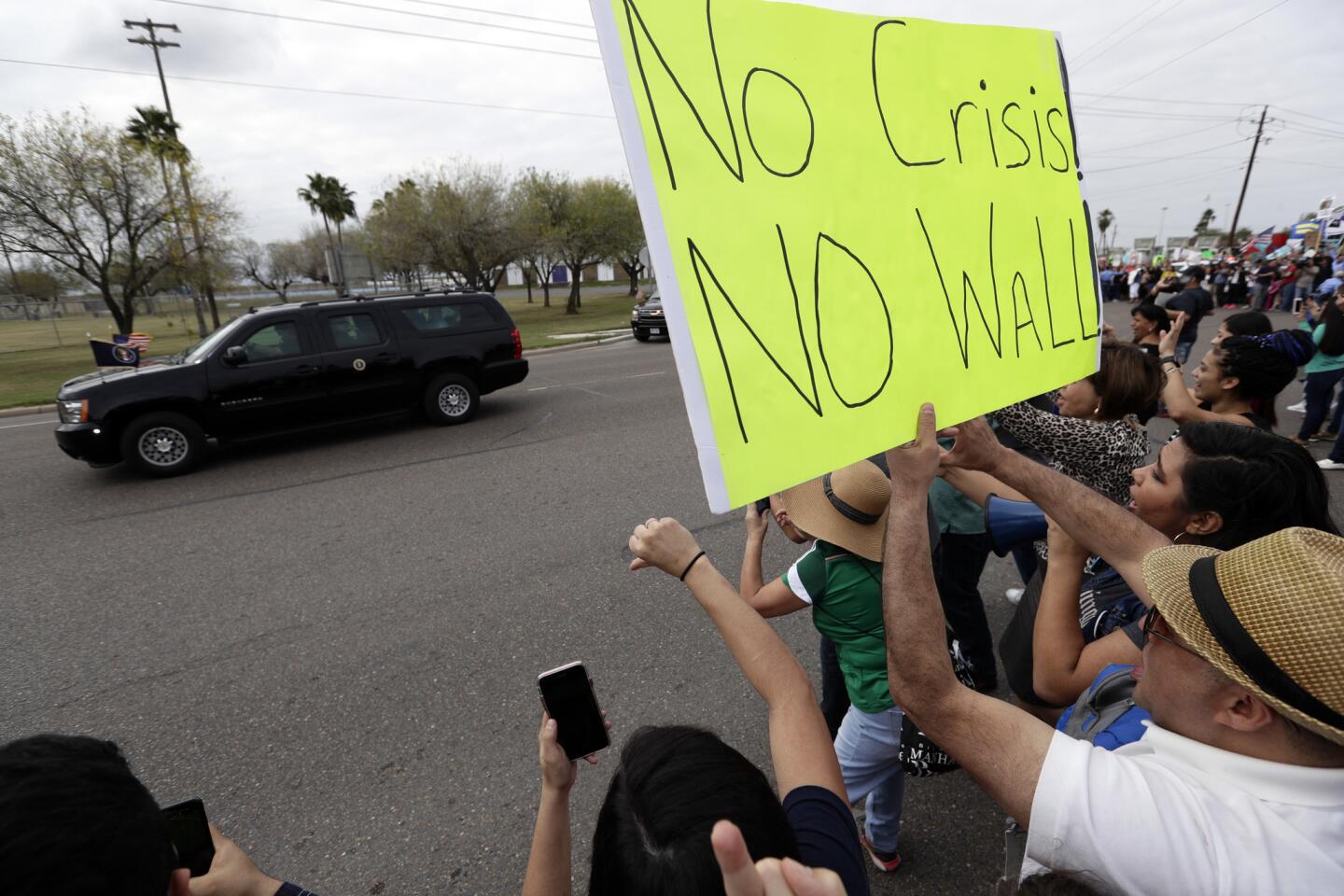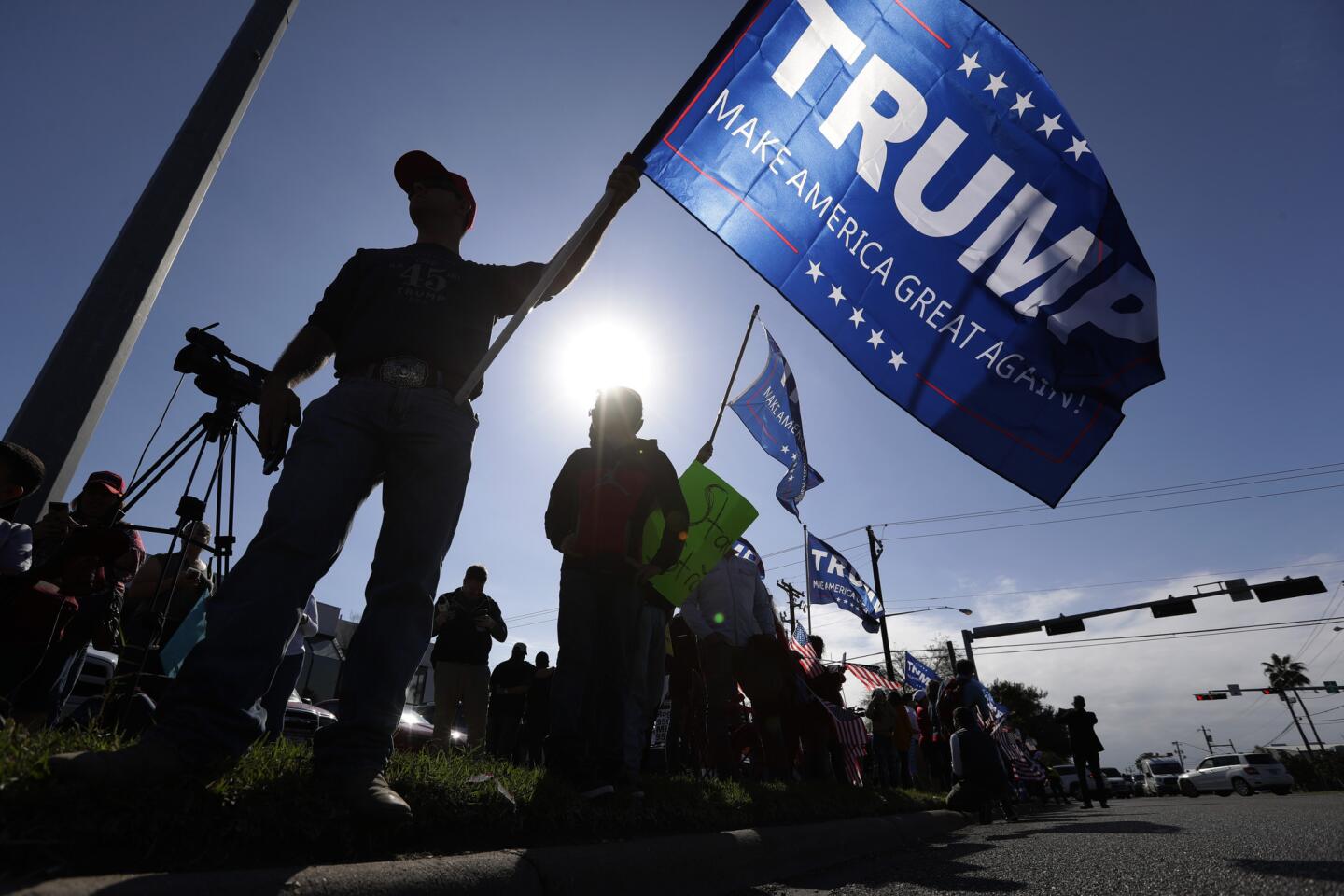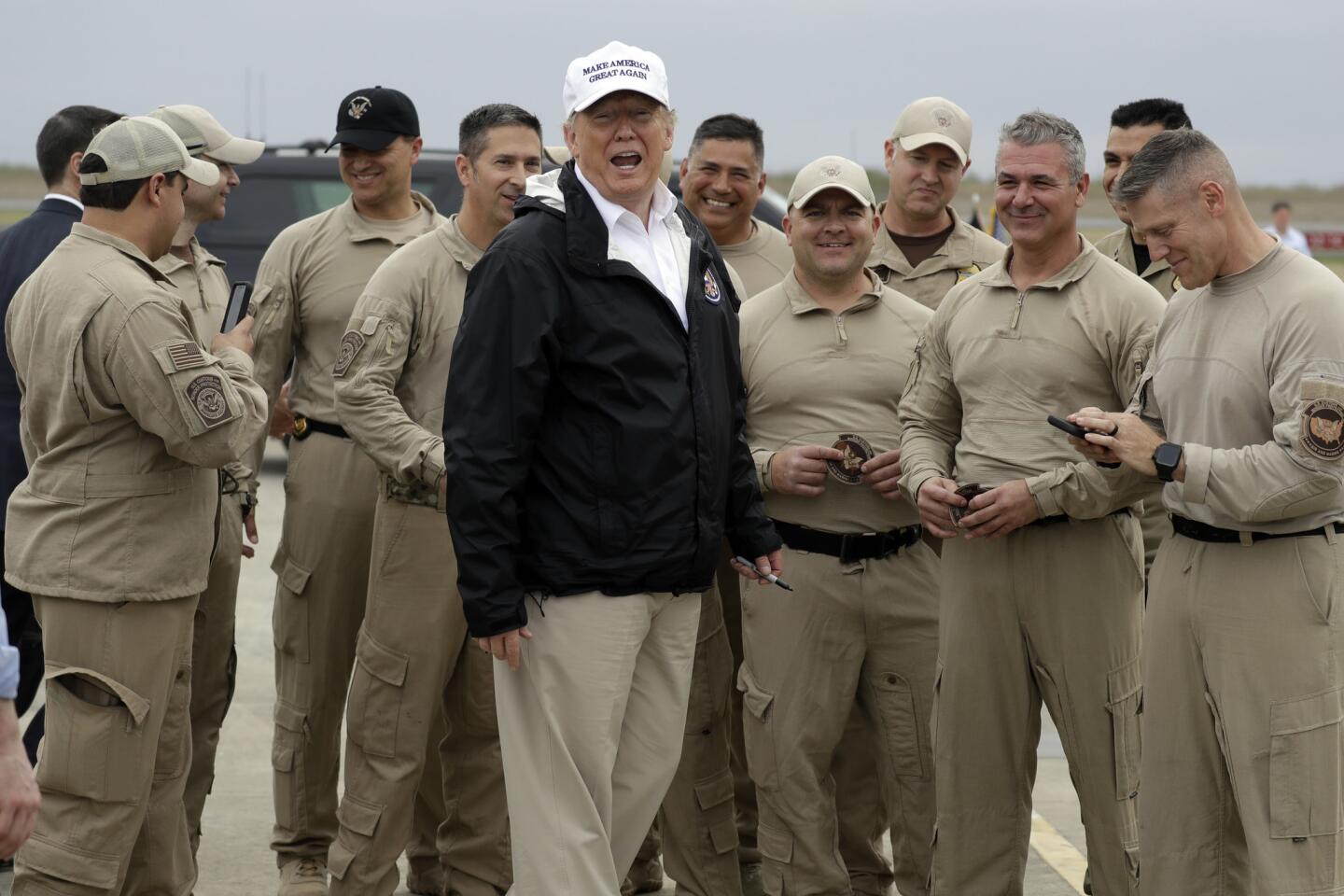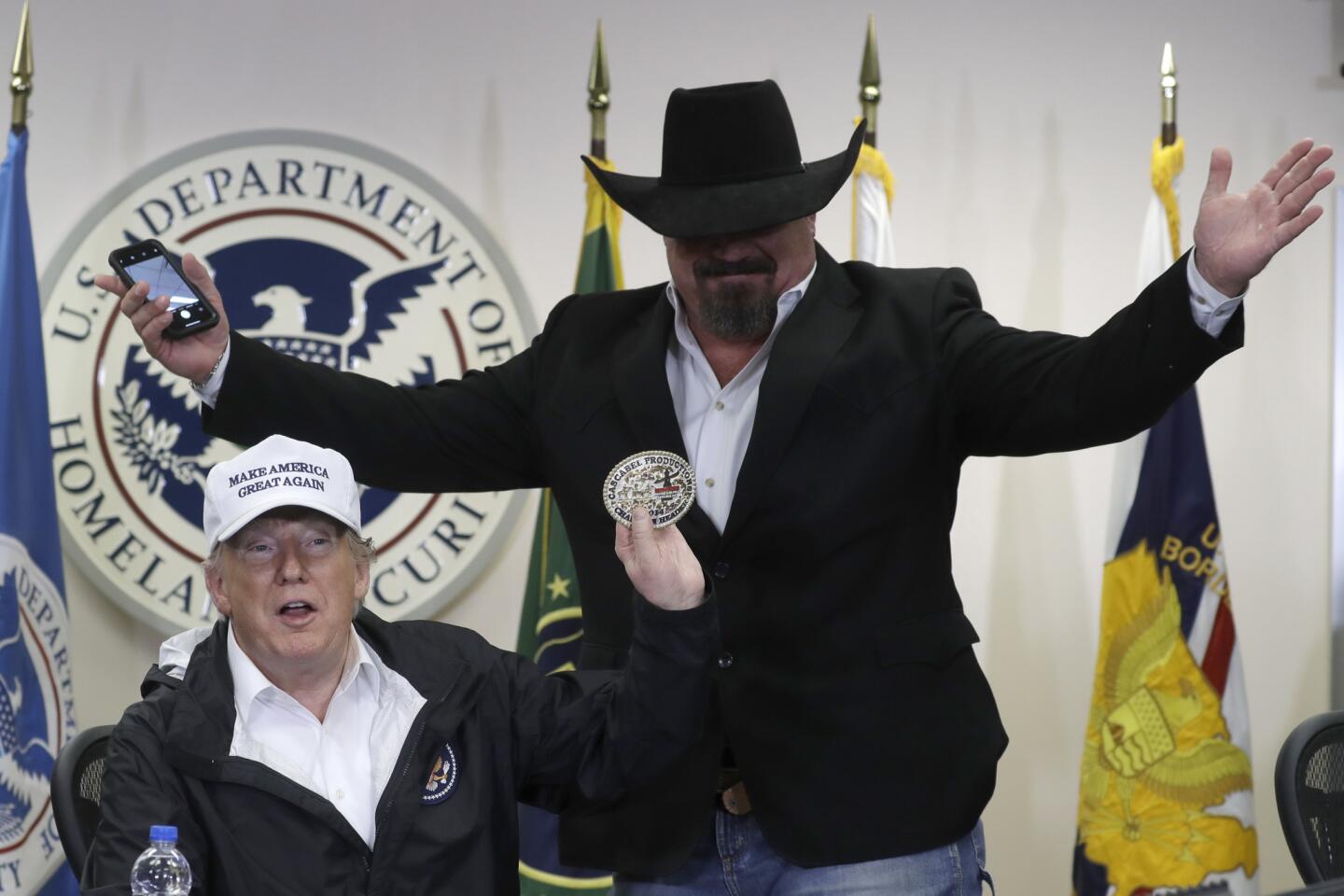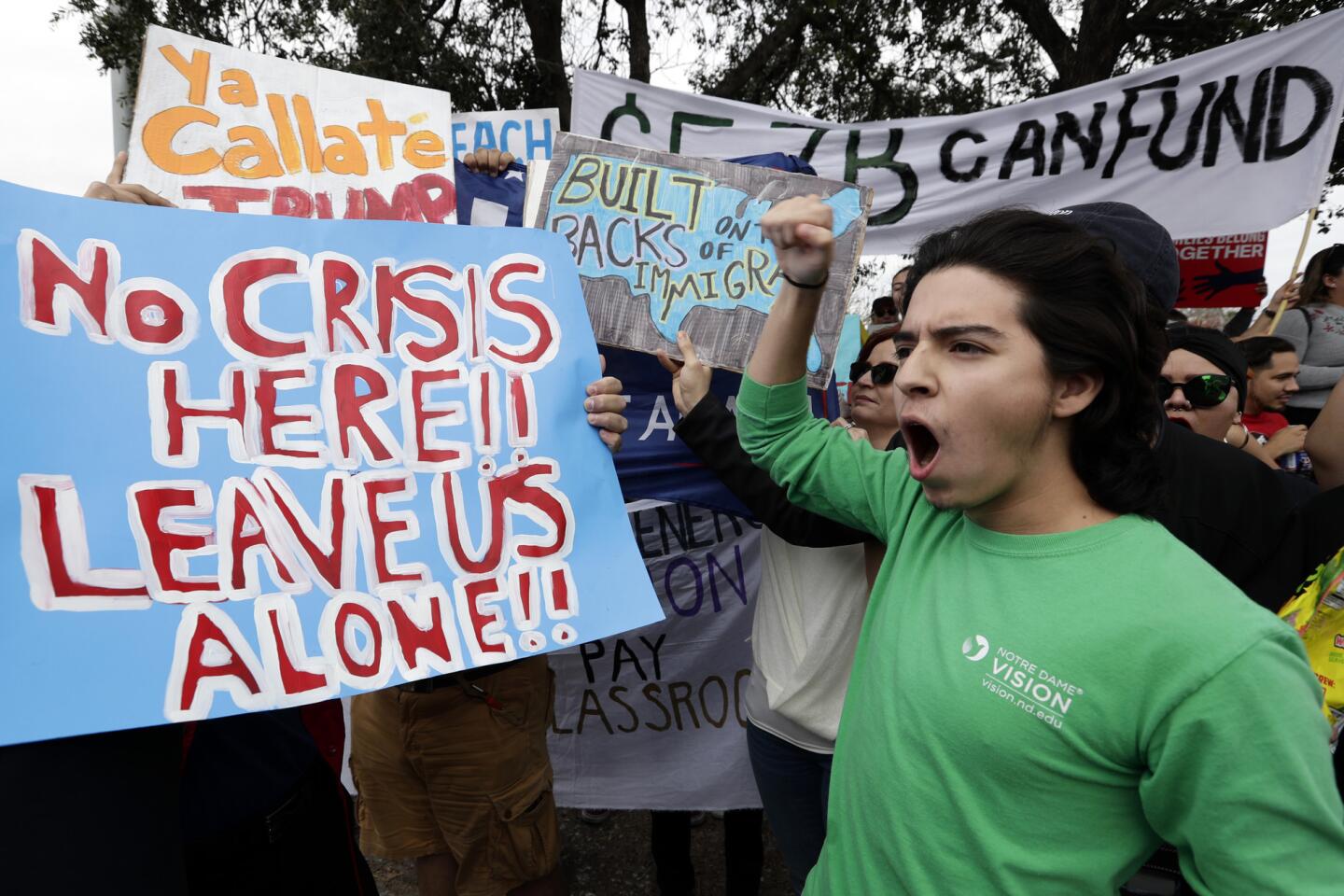Trump vows he will ‘probably’ declare national emergency if Congress doesn’t OK wall money
- Share via
Reporting from McAllen, Texas — President Trump moved closer Thursday to declaring a national emergency to bypass Congress to secure funds for a border wall and resolve a government shutdown now into its 20th day.
“I have the absolute right to declare a national emergency,” Trump said to reporters before departing the White House for McAllen, Texas, where he toured Border Patrol facilities and met with agents along the U.S.-Mexico border.
“If this doesn’t work,” he said of getting Congress to include wall money in its final government-funding bill, “probably I will do it. I would almost say definitely. This is a national emergency.”
Administration officials say that move could allow the president to tap money already approved by Congress for other purposes, including funds for military construction and disaster relief.
Insisting that he would prefer that Congress approve $5.7 billion he’s requested for the wall, Trump left himself some wiggle room, but clearly signaled that an emergency declaration is becoming more likely. And already-slim prospects for a deal with Congress seemed to evaporate as Trump was in Texas.
Vice President Mike Pence, at the Capitol back in Washington to confer with lawmakers over the impasse, told reporters the administration would not support any compromise giving legal protections to undocumented young immigrants who years ago came to the U.S. illegally as children. A bipartisan group had been negotiating a trade-off between such protections and wall funding, but by afternoon Sen. Lindsey Graham (R.-S.C.) said a deal was all but dead, adding, “We’re kind of stuck.”
Trump, in remarks at the White House as he departed for Texas, also put a new spin on the discrepancy between his famous, often-repeated campaign promise that Mexico would pay for a border wall and the fact that Mexico is not doing so.
“When, during the campaign, I would say, ‘Mexico is going to pay for it,’ obviously, I never said this and I never meant they’re going to write out a check,” the president said.
In fact, Trump did specifically assert that Mexico would make direct payments, threatening at one point to halt remittances that Mexican American workers send to relatives in Mexico as a tactic to force Mexico to “make a one-time payment of $5 [billion] to $10 billion.”
Trump repeated his more recent claim that Mexico would indirectly pay for the wall through a new North American trade agreement. That agreement has yet to win legislative approval in Congress, Mexico or Canada and has no provision in it that would involve Mexico reimbursing the U.S. for the costs of a wall.
Trump’s comments and the visit to the border came a day after his White House meeting with congressional leaders ended abruptly, with the president walking out of the room after Democratic leaders told him they did not plan on approving more money to fund a border wall.
“I didn’t pound the table. I didn’t raise my voice. That was a lie,” Trump said, describing the acrimonious end to the meeting. “I very calmly said, ‘If you’re not going to give us strong borders, bye-bye. I didn’t rant like you reported.”
Although Democrats have approved $1.3 billion for border security in the current fiscal year, of the $1.6 billion that Trump originally asked for last year, the president has been unable to persuade them to now support the $5.7 billion despite his argument that conditions have become a national security crisis.
In another sign that the shutdown that has closed a quarter of the government could continue for some time, Trump tweeted from Air Force One en route to Texas that he has decided not to attend the annual World Economic Forum in Davos, Switzerland, which is less than two weeks away.
In McAllen, Trump was greeted by more than a thousand demonstrators, most of whom opposed a wall. A few expressed support.
At a round table with aides and local officials, the president sat before a table displaying items said to have been seized by Border Patrol agents — an AR-15 rifle, a plastic bag full of cash and black-taped bricks of heroin and methamphetamine — and repeated his vow to build “a powerful steel barrier” to stop what he described as a hellish influx of dangerous immigrants.
“The people that are coming in — the criminals, the gangs, the traffickers, the drugs — it’s all crime,” he said, an assertion at odds with government figures.
Later, at an outdoor briefing along the border, Trump told reporters that Democrats “are losing the argument badly.” Polls, however, have shown that significantly more Americans blame Trump for the unpopular shutdown while his proposed wall has consistently had minority support, except among Republicans.
With the partial shutdown two days from matching the longest on record, the option of declaring a national emergency has become more attractive to Trump. Although an emergency declaration would face legal challenges, it would provide him a way to reopen the government without appearing to cave on his demand for a wall.
Trump has received conflicting advice about declaring an emergency from administration aides and friends outside of Washington. Some view it as an effective way out of the prolonged stalemate that would still show the president’s supporters that he continues to fight to achieve his signature campaign promise.
Other conservatives, however, have cautioned that declaring a national emergency to bypass a stubborn Congress would set a dangerous precedent, one that could backfire on Republicans in the future should Democrats retake the presidency and attempt to fund other initiatives without legislative approval.
Can Trump declare a national emergency to get his border wall? »
“We have to be careful about endorsing broad uses of executive power,” Sen. Marco Rubio (R-Fla.) told CNBC in opposing an emergency declaration. “If today the national emergency is border security, tomorrow the national emergency might be climate change.”
Even Rep. Mark Meadows of North Carolina, a Trump ally who leads the conservative House Freedom Caucus that backs the president’s hard line, said the president should pursue an emergency declaration as a “last resort.”
Trump and his advisors have said that by declaring a national security emergency he could pay for a wall by diverting military funds that Congress has approved for other purposes, including for the Army Corps of Engineers.
With Trump in Texas was Lt. Gen. Todd Semonite, the Army Corps’ commanding general. A Pentagon official said the Corps is preparing options to present to Trump should he declare an emergency. It is reviewing accounts to see how much money is freely available and, where contracts have been made, how much it might cost to break them.
Yet, Rep. Mac Thornberry of Texas, the ranking Republican on the House Armed Services Committee, has emerged as a vocal opponent of taking money from the Pentagon’s budget.
Still, some Republicans in Congress see an emergency declaration as perhaps the only way the shutdown can end quickly, given both sides’ unyielding stands. “It will change the landscape — might be for the better, might not be,” said Sen. Richard C. Shelby of Alabama, the Republican chairman of the Senate Appropriations Committee.
In dismissing the idea of a compromise that would protect young undocumented immigrants — the so-called Dreamers — from deportation, Pence echoed Trump’s argument that the administration would prefer to await a ruling from the Supreme Court on the constitutionality of a temporary Obama-era order that protected the longtime immigrant-residents.
The vice president, expressing confidence that the court would find the order an unconstitutional use of executive power, said that outcome would then force both sides to negotiate an alternative measure to address the Dreamers’ plight as well as tighten immigration laws.
The president, during the freewheeling exchange with reporters on the South Lawn as he left for Texas, complained that the Democratic leaders, House Speaker Nancy Pelosi of San Francisco and Senate Minority Leader Charles E. Schumer of New York were more difficult to negotiate with than Chinese President Xi Jinping.
“I really believe the Democrats don’t care about crime,” he said. “They’ve been taken over by young people who — I really believe this — I think they’re crazy.”
The president, who said last month he would “proudly” take responsibility for a shutdown, would not accept the premise that he now bears responsibility for resolving it.
“The buck stops with everybody,” he said.
Stokols reported from Washington and Hennessy-Fiske from McAllen, Texas. Times staff writers Jennifer Haberkorn, Sarah D. Wire and David S. Cloud in Washington contributed to this report.
More to Read
Get the L.A. Times Politics newsletter
Deeply reported insights into legislation, politics and policy from Sacramento, Washington and beyond. In your inbox three times per week.
You may occasionally receive promotional content from the Los Angeles Times.

